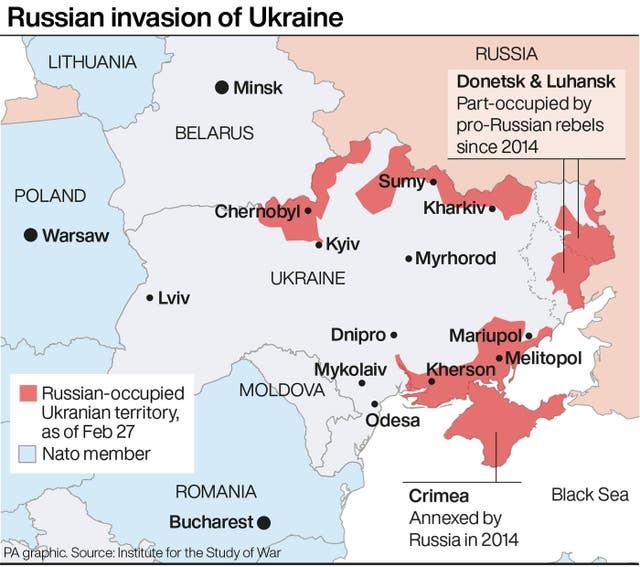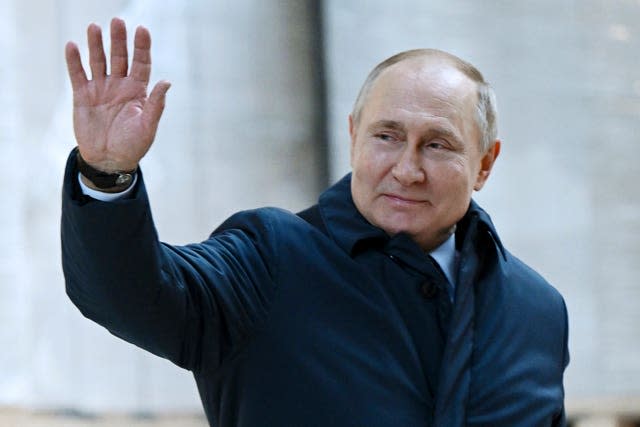Boris Johnson says Vladimir Putin has made a ‘colossal mistake’ on Ukraine
Boris Johnson said Vladimir Putin has made a “colossal mistake” invading Ukraine as Downing Street eyed the possibility that sanctions would bring down the Russian president’s regime.
The Prime Minister praised Ukraine for putting up a “fierce resistance”, proving Mr Putin wrong to think his tanks would be “garlanded with roses”.
Mr Johnson will continue his diplomatic push by travelling to Poland and Estonia for meetings with his counterparts and Nato secretary-general Jens Stoltenberg on Tuesday.
Ministers received a briefing on Monday on the scale of discontent among the Russian people to the Kremlin’s attack on their neighbouring nation.
Mr Johnson opened the Cabinet meeting saying: “It is becoming clearer with each day that Putin had made a colossal mistake believing that the guns of his tanks would be garlanded with roses when instead the Ukrainian people had put up a fierce resistance in defence of their homeland.”
The Prime Minister’s official spokesman said Mr Johnson told officials the latest intelligence suggested Russian troops have been “hampered by logistical problems and the heroic efforts of the Ukrainian military who are inflicting significant casualties on Russian troops”.
The Cabinet was updated by the chairman of the Joint Intelligence Committee, Sir Simon Gass, and the Chief of the Defence staff, Admiral Sir Tony Radakin, who No 10 said discussed “the discontent among many of the Russian people including an anti-war petition that has attracted around a million signatures”.

With western sanctions biting, the Russian central bank was forced to sharply raise its key interest rate to save the rouble from collapse.
Downing Street said further measures would be taken against Russian businesses and individuals “shortly”, as Mr Johnson presses for Russia to be cut out of the Swift international payment system “completely”.
Adding to the account of the Cabinet meeting, the Prime Minister’s official spokesman said: “He said Putin had also underestimated western unity and the strength of the sanctions his action could lead to.”
Downing Street warned British businesses they should “think very carefully if they are still continuing to do anything that props up the Putin regime”, which should be “treated like a pariah state”.

The Prime Minister’s official spokesman said Britain does not want to “unnecessarily inflict damage on the Russian people” but added that western sanctions “are to bring down the Putin regime” and “anyone who is actively seeking to support any elements of the Putin regime should think very carefully”.
No 10 said the Prime Minister’s official spokesman “misspoke” when he said western sanctions are designed to bring about regime change, but the slip-up portrayed how some think the pain inflicted on the Russian president’s inner circle could have wide-reaching ramifications.
Despite the continued assault, Ukraine has agreed to talks with Moscow and sent a delegation to the border with Belarus for the meeting.
But British officials are not holding out much hope for the peace talks, and fear Moscow could use more indiscriminate force if the invasion stalls.
Home Secretary Priti Patel was expected to outline more action to help Ukrainian refugees seek safety in the UK after coming under pressure to go further than existing measures.
The UK Government announced the relaxation of visa rules for immediate family members of Ukrainians settled in the UK after coming under intense criticism over the weekend.
But Labour called for ministers to immediately extend the opportunity to wider relatives before setting out a “broader sanctuary route” to help other Ukrainians.
Defence Secretary Ben Wallace said he does not doubt the UK will go further to match the “very generous” schemes that have helped in other conflicts.
He dismissed Mr Putin putting his nuclear forces on heightened alert as part of the Kremlin’s “battle of rhetoric” rather than a real threat.
In other developments:
– Ukrainian President Volodymyr Zelensky said 16 children have been killed and another 45 injured during the Russian invasion, adding “every crime, every shelling by the occupiers bring our partners and us even closer”.
– Average UK petrol prices exceeded £1.51 for the first time after the Russian invasion led to oil prices hitting an eight-year high over concerns about the reliability of supplies.
– The sanctions imposed by Britain and allies appear to be having an impact, with the rouble having sunk by nearly 26% against the US dollar by Monday morning.
– Switzerland strayed from its history of neutrality to adopt EU sanctions against Russia, in a major step that will curtail the ability of rich Russians of the haven to store their wealth.
– BP shares dropped sharply after the company announced it is selling its £10 billion stake in oil producer Rosneft, which it co-owns with the Kremlin, after pressure from the Government.
The Treasury was targeting Russia’s central bank with sanctions in a response co-ordinated with the US and European allies.
Chancellor Rishi Sunak said the move shows the “steadfast resolve in imposing the highest costs on Russia and to cut her off from the international financial system so long as this conflict persists”.
Mr Putin cited “aggressive statements” from the Nato defence alliance and the financial sanctions imposed in response to his invasion in issuing orders to increase the readiness of Russia’s nuclear weapons.
Mr Wallace said his 12-year-old son called him, worried about Moscow’s nuclear alert, but the Cabinet minister played down the shift’s significance as not being a change to the current “nuclear posture”.
“We will not do anything to escalate in that area, we will not do anything to feed any miscalculation, we take it very, very seriously,” he told BBC Radio 4’s Today programme.
“But at the moment this is a battle of rhetoric that President Putin is deploying, and we just have to make sure we manage it properly.”
He warned that the Russian offensive in Ukraine is likely to become “more violent”, as troops close in around the capital, Kyiv.
Downing Street said an attempt by the Kremlin to blame unspecified “unacceptable” remarks from Foreign Secretary Liz Truss for Mr Putin’s heightening of the nuclear alert was an attempt to “distract” from the situation on the ground in Ukraine.
During a call on Saturday, Mr Johnson told Mr Zelensky that Britain will do all it can to get more arms to his military.
Mr Zelensky warned the Prime Minister that the next 24 hours will be a “crucial period” for Ukraine as his army puts up a fierce resistance against invading forces.
